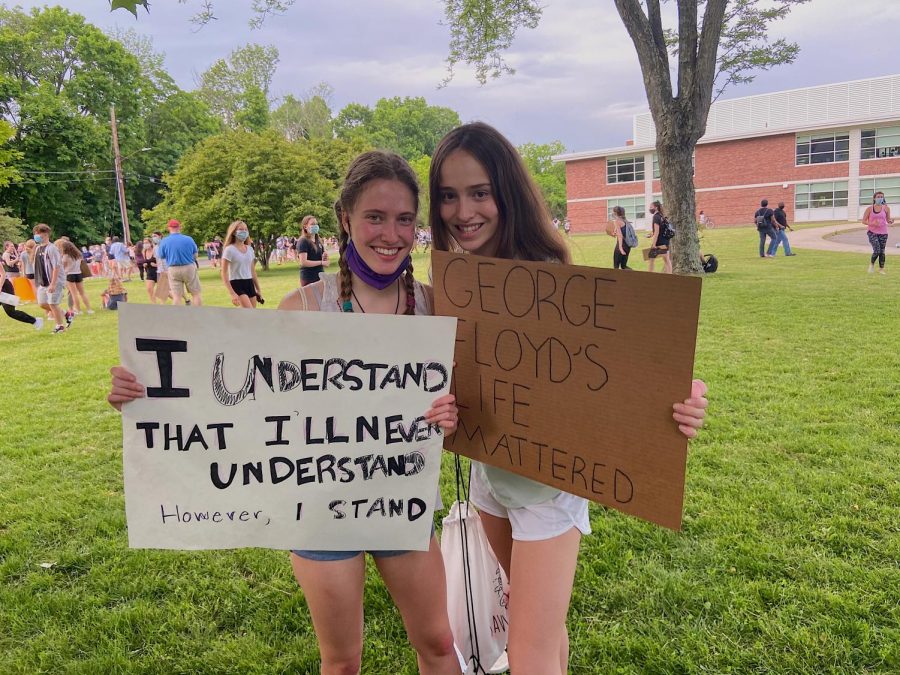Fighting for Justice: Danbury and New Canaan Protests
June 24, 2020
As calls for justice spread around the country in response to the murder of George Floyd, I had the opportunity to attend protests in both Danbury on June 3rd and New Canaan on June 5th. While both protests were peaceful and impactful, there were notable differences between the two. The Danbury crowd had more people of color while the New Canaan march was an almost all-white crowd. The Danbury march was about demanding change while the New Canaan march focused on showing solidarity.
Since Danbury was my first protest, I was nervous to go; I feared I would feel out of place. I hadn’t had time to make a sign, so I was worried that other marchers would be annoyed or judgemental. I couldn’t have been more wrong. Once I arrived, the crowd immediately invited me in, and I felt totally comfortable.
One difference between the two protests was the diversity. According to the Connecticut Insider, roughly a thousand people attended the march in Danbury. My impression was there were more people of different ethnicities, ages, and socio-economic class in Danbury compared to New Canaan. They advocated for justice using forceful and effective chants like “Hands up, don’t shoot” and “No justice, no peace, no racist police. ” When one chant ended, another quickly began. These chants gave the protest an atmosphere of constant activity. At one point, when the majority of marches took a knee at the police station, a woman yelled “George Floyd was a king. We don’t kneel for kings; we stand!” While most people ignored her, a small group awkwardly stood, trying to follow her instructions. The conflict revealed that some protesters had different ideas of how to properly honor George Floyd and other victims of police brutality. While people were honoring his life, their demands went beyond justice for Floyd.
Something especially memorable was the cheering from cars. We walked in the streets, and cars passed us a couple of times. Their honks of support gave the protesters confidence and assurance that what we were doing was on the right side of history.
Despite their differences, according to the Patch, the protests in New Canaan had roughly the same amount of people as Danbury. The New Canaan crowd consisted of a less diverse population, much more white than black. They vowed to be allies, as illustrated by the sign “I understand that I will never understand; however, I stand.” Protestors shouted the same chants that I heard at the Danbury protest and were delivered with the same energy and enthusiasm. The most notable moment of solidarity was at the end of the protest, when the marchers started singing “Lean on Me.” They shouted out the song’s lyrics, “Lean on me, when you’re not strong, / And I’ll be your friend, I’ll help you carry on.”
This song represented supporting each other even in the hardest of times. It brought a sense of togetherness to the protest. While some nationwide protests have been framed as violent and destructive, neither of the protests I attended had evidence of that. I saw unity. Marchers played music and passed out water to those who had forgotten to bring any. These small acts of kindness exemplified their togetherness.
A common theme between both protests was the sense of community and determination to mend the broken aspects of our justice system. My takeaway from this experience is how wrong my expectations were. I was assuming that the crowds would be small, maybe twenty people. However, I was happily surprised to see how many people shared a common goal of change. This positive experience has inspired me to protest again. I will look for more opportunities to march for a cause.
The SLS community can follow the lead of these protesters. Instead of just posting black squares on social media or putting pictures on your story, you can take action; march, educate yourself, donate time and money, and sign petitions. As Bill Withers wrote, “Sometimes in our lives we all have pain, / We all have sorrow, / But if we are wise, / We know that there’s always tomorrow.”





Jennifer Millones • Aug 23, 2020 at 5:43 pm
Great article, Ale. I love that you marched in support of justice for all people.
Elaine Camerota • Jun 24, 2020 at 11:10 am
Wonderful article, Ale: clear and perceptive.